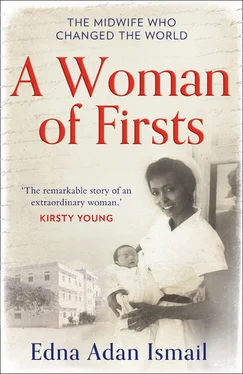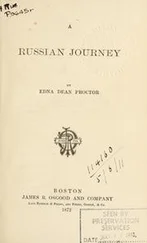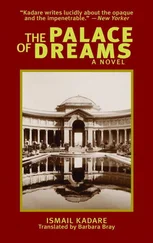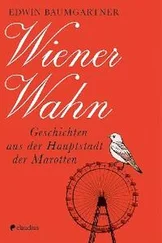My grandmother Clara, my mother’s mother, supervised everything. As they were only allowed to take minimal luggage she wrapped cash, jewellery and the family’s most precious things in a bag she tied around her waist. In the fishing village we were placed in different huts to await the signal that the warship had arrived in the dead of night. My mother, grandmother and I were shivering together in one such hut with several others when a band of thieves burst in brandishing knives and demanding valuables. Clara quickly blew out the kerosene lamp, which plunged the hut into darkness. The women started screaming, which alerted the local villagers who arrived just as the robbers fled. Many claimed afterwards that if it wasn’t for my grandmother they’d have lost everything they possessed.
Once in Aden, Clara once again took charge, selling possessions to rent us a comfortable property. She and my mother had no idea what had happened to my father and grandfather, who’d remained behind to serve the Allies. It was months before we learned that they’d been captured and imprisoned by the Italians and packed into cells in a makeshift prisoner-of-war camp in Hargeisa. Dad spoke of his experiences later and told me that they were treated badly, with little food or water and no toilet facilities. Their cell was hot and crowded with nowhere to sit. ‘If you ever have to go to prison be sure to take a hat with you, Shukri,’ he advised. ‘To urinate we’d stand on each other’s backs and pee out of the window, but the only receptacle we had for bigger business was a fellow prisoner’s hat!’
Hargeisa had fallen to the Italians on 5 August 1940, despite repeated RAF sorties that dropped more than sixty tons of bombs on Somaliland. The rest of the country fell two weeks later with the loss of thirty-eight Allied soldiers and more than two hundred wounded. It was another few months before the operation to recapture it began in early 1941. Hargeisa was liberated – along with my father and grandfather – and the famous Somaliland Camel Corps (a British Army unit based in Somaliland) resumed its military operations. The Italians were pushed out and we were free to go home.
Once back home, my parents discovered that although our government-owned house was still standing, it had been ransacked and the looters had done more damage than the shelling. Hargeisa Hospital, which was erected by the British military during the Second World War and initially comprised mostly tents, had been partly damaged too, so Dad lived in quarters until my mother could get things straight at home. Many friends and relatives had been killed or injured and the only event that brightened our lives was the birth of my brother in late 1941. Farah was born prematurely and was more than four years my junior, but he became my joy as well as the pride of our family.
***
Having survived the Italians my first proper memories are of Berbera, a major coastal town we lived in until I was six years old and where the smell of the ocean pervaded everything. A key character in those recollections was a man known as ‘Mohammed Hindi’ or Mohammed the Indian who ran a dukaan or general store on a corner not far from where we lived. In it, he sold every kind of foodstuff.
As Somali women didn’t often leave their homes, Dad did most of the shopping and would often take me with him as a treat. Mohammed would see me and, with a huge grin, cry, ‘Ah! A biscuit for the doctor’s daughter!’ before handing me a custard cream from a counter cluttered with sweets. Nothing has ever tasted as nice before or since even though I have had them in every country I have visited; I am still looking for the divine taste of those old-fashioned British custard creams. My second big treat in that corner shop was to be allowed to stir the ice cream while Dad shopped for the weekly provisions of sugar, rice, flour, corned beef, tins of beans, butter and jam. Mohammed made the ice cream in a huge bowl packed in blocks of ice, adding eggs, milk, sugar and cardamom that had to be churned the old-fashioned way. If I was lucky, he’d also let me lick the bowl.
I remember that wooden shack of a store so clearly with its high tin roof and dry goods piled to the rafters. It was in the area of town where the Europeans lived, so the shopkeeper cleverly catered to their needs with foreign goods. To me, it seemed as if he sold every item in the world stacked haphazardly, and yet he knew exactly where everything was. I loved that kind, smiling Indian and I loved being spoiled, much to the consternation of my mother Marian. She was, I think, disappointed in me her whole life. From the day I crawled under the dining room table to my later more controversial years I was trouble in her eyes. From the outset I was a rebellious child, devoted to my father, and favoured by both grandmothers. My hooyo (mother), expected me to stay inside and do household chores such as peel potatoes, prepare onions or help wash the sheets. I hated such tasks and would much rather play barefoot outside with my pets, seek out wild animals, climb a tree, or wrestle with the neighbourhood boys. The only job I did enjoy was to accompany the house help down to the well by the river to refill the empty water barrels, something he did at least twice a day. Whenever he had to stop and rest in the heat as he rolled the filled barrel back up the hill to replenish our tank, I had to wedge a large stone under it to stop it rolling away. This felt to me like important, valuable work.
I once found a snake in our household water tank and spent ages trying to get it out with a stick, but was roundly scolded by my mother who was terrified I’d be bitten. Mum kept insisting that I needed to be trained as to how a Somali girl should be correctly brought up. She bought me pretty dresses that were quickly ruined and did her best to tame my Afro hair, tugging at it with a wide-toothed comb until I screamed, or trying to twist it into plaits which quickly came undone. Whenever I was made to stay inside with her, I showed such little aptitude for cooking or sewing that she’d soon release me from my chore. Sulking I’d sit on the verandah peering out and measuring the time of day by the eedhaan , the traditional call to prayer at dawn, midday, mid-afternoon, dusk and at night. If I was really bored I’d flick through my parents’ precious English books wondering what the strange symbols meant, only to be accused of ruining them with dirty fingers when I had no business looking at them, being an ‘illiterate girl’.
I loved it best when Dad came home from work at the end of the day and sat to eat with us by the light of a kerosene lamp as giant moths flapped noisily at the mosquito screens. He’d instruct that the fire be lit on cold nights and burned frankincense to fill the house with the heavenly scent that is thought to be spiritually healing and chase away evil spirits. Sadly, Dad worked so hard that he never seemed to have time to linger, running back to the hospital at the slightest emergency after a hug and a kiss. He was an unusually affectionate man in a society where men are not supposed to show affection in case it’s seen as a sign of weakness. My father loved my mother very much and put up with a lot from her. The youngest and most spoilt of two daughters raised in Aden by Somali parents who were from a small community of Catholics, she was more English than the Queen in many ways and always envisaged a better life. Her sister Cecilia had married a successful businessman from French Somaliland and the couple had moved there to raise a family. By marrying a Muslim and remaining in Somaliland, my mother had tied herself to a life that dictated she should have little of any importance to occupy her days. I know she loved my father very much and it can’t have been easy married to a workaholic who was moved from town to town every two years, but she was often depressed and never stopped complaining.
Читать дальше












